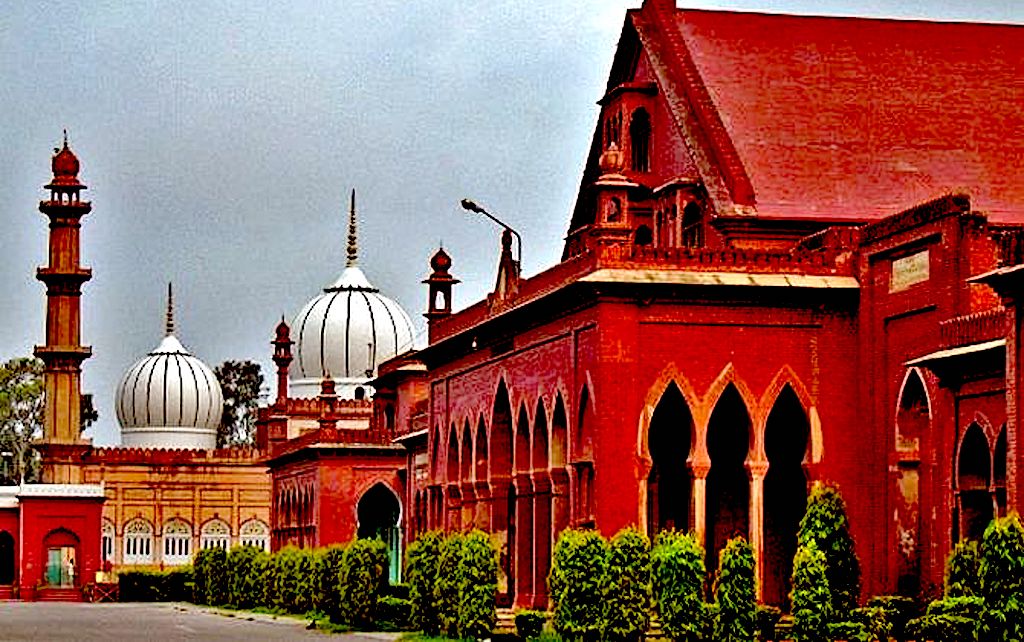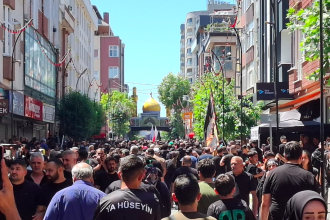Possibly, for the first time, the century long scam of AMU VC empanelment was exposed, and brought out this year in March 2023. Since 1920, only UP-Hyderabad Urdu elites have been its vice-chancellors. The only exception to the rule is the VC during 2007-2012, who was from a Malayalam-speaking Moplah community. The manner in which he had cracked down a deeply entrenched clout and the manner in which he was chastised and harassed by the clout is a different tale in the history of AMU. For the first time such a scam was made an issue of intense and animated debate in the English language media and portals, this year, in March 2023. At least two essays in The Print (March 6 and 10, 2023) and three pieces in the Rediff.com (March, 7, 18 and 22, 2023) appeared. Yet, the worst apprehensions became truer on October 30, 2023. It seems that the historically entrenched clouts have asserted with greater vengeance to safeguard their preeminent privileges in lording over the AMU.
Of these five interventions through columns, at least two are by someone who himself stands empanelled by the Executive Council of AMU on 30th October 2023. He is an insider (a serving faculty of AMU). Despite being a law-academic and regular commentator, he doesn’t have anything to say against the proceedings of the Executive Council on 30th October. Some of the insiders have raised objection against the proceedings about which we will discuss in the following paragraphs. The AMU-EC presently comprises of 20 members including the acting Vice Chancellor. Another name having been empanelled is the Principal, Women’s College of AMU cum EC member. She also happens to be the wife of the acting VC. Incidentally, one of the above five columns had raised the issue of a woman as AMU’s next VC.
The AMU didn’t advertise its post of VC inviting applications from the candidates. It didn’t specify age-limit or any other criteria. Presumably, the relevant UGC Regulations would be the reference. Does it really say that someone above 65 years of age will not be empanelled? One is not sure. Secondly, it was merely locally known at a short-notice. On 23 October, a memo was issued and locally circulated that on 30th October the AMU-EC will meet to prepare a panel of five candidates. Thus the candidates from outside AMU got a mere 6 days’ time to submit their application, if at all somehow they would come to know of the date of empanelment by the EC.
Around 32 candidates submitted their applications. Of these, 12 were screened out because they didn’t get a member of EC to propose their names, and another member to second it. Was this process of screening a prior knowledge to the applicants? No. It hasn’t been made transparent by the AMU and its EC. The twenty candidates were fortunate enough to have got proposers and seconders (or endorsers) from among the EC members. Of these 20 candidates, a large number are insiders. The culture of inbreeding is deeply entrenched in AMU. Its admission policy reserves 50% of the enrolment for the “Internal” students, besides reserving some more seats for the children of employees and alumni. This practice of inbreeding now stands brazenly extended to the empanelment of VC.
On 30th October 2023, what happened inside the EC is interesting. The EC decided that the meeting would be presided over by the acting VC, despite the fact that his own wife as well as a member of the EC appeared as a candidate to be empanelled. The wife, having become a candidate herself, recused from the meeting/voting. Thus the EC now became a body of 19 members. Each EC member had to vote for five of the 20 candidates, in order to send a panel of five to the AMU Court. The AMU Court, with a present strength of about 90 members, would send a panel of three to the Visitor (President of the Republic), on 6th November. Of these, one would eventually become the next VC of AMU.
An insider, the abovementioned law academic, got nine votes in the EC. Another insider got eight votes. The acting VC’s wife got only seven votes. Five more candidates got seven votes. To break the tie, the EC decided on the spot that the acting VC would also cast his vote now. Thus, the wife now got one more vote. The other five were put to fresh voting by all the 19 members in order to get two of them. Why didn’t the EC put the acting VC’s wife also among the candidates having tie, is a question that asks for answer? This is how the panel of five has been prepared. Of these five, only one candidate is from outside AMU, rest four are AMU teachers, of whom, one, a noted cardiologist, has retired and is above 65 years of age. He, in the second, “disputed” round of voting, got 12 votes.
As said earlier, some people including a former member of the AMU Court, been raising their objections against the way the EC conducted the voting for empanelment on 30th October 2023. The objections remain informal, circulated on the WhatsApp, as also submitted to the Union government. The law-academic however is reported to be claiming that, he, having secured 9 votes in EC, should be treated to have got the highest. The cardiologist (retired professor; age above 65 years) has got 12 votes, when the five candidates (having a tie of seven votes) were put to re-voting. Isn’t this a brazen violation of the principle of secret ballot? In other words, the law-academic doesn’t have any objection against the procedure of voting, followed by re-voting only for the candidates having tie. In the facts narrated above, the empanelled law-academic doesn’t see any objectionable point to be raised by him. On the age of 65+ also, he has understandably got no objection. At least nothing has come out from him, in oral or written form, as yet. This is indeed quite interesting about the sense and understanding of jurisprudence on the part of the law-academic, who keeps commenting on the judicial verdicts, laws and the Constitutional provisions.
Unlike most other central universities, the AMU has got some special treatments. It has got its Executive Council with a total strength of 28 members. Three are nominated by the Visitor (President) and one by the Rector (Governor, Uttar Pradesh). Rest of the 24, are internals. Of these, four are faculty members elected by the faculty; whereas, the Proctor and the senior-most Provost, are also the EC members, who are handpicked by the VC. Five senior-most Deans are also EC members.
This specific category was kept vacant for a long by the VC, who became BJP’s MLC in Uttar Pradesh and quit the office in April 2023. His term of five years was completed in May 2022; he sought an extension of one year to form a panel of the next VC. He didn’t do this till April 3, 2023, when he quit. On 5th April, his Pro Vice Chancellor started functioning as acting VC. Rules say that the Pro VC’s post is coterminous with the VC. Thus, on April 3, the PVC too should have quit the office, and as per the AMU rules, a Dean (senior most Dean in the EC; five senior-most Deans are EC members) should have taken charge of acting VC in April 2023.
The acting VC was forced to convene elections for the four EC members. The four were elected on the strong wave against the VC turned MLC, who was a faculty member of AMU. Thus, the 6 years tenure of the last VC had created huge anti-internal sentiments among the AMU people. Yet, the four elected teachers in the EC, on 30th October, went on to propose the candidature of the internals. Of the five candidates empanelled, four are internal; the one, who is external, is practically as much internal as he has got his clouts within AMU, particularly those belonging to the sub-region of Uttar Pradesh he himself comes from. In fact, given the structure, composition and procedure, no candidate without a clout within AMU can ever be empanelled as its VC.
The EC of all other central universities, prepare a two-member search cum selection committee. A third member into the search cum selection committee is added by the Visitor. This three-member search committee, none of the three serving with the said university, through advertisement, invites application from the candidates intending to become the next VC. The shortlisted candidates are interviewed by the search-committee which may add some more members on the interview board. The AMU, having got some kind of minority “character” (its minority “status” is sub judice before a nine bench of the Supreme Court) has been “abusing” its “autonomy” to perpetuate incestuous inbreeding. This time, that is, on 30th October, the longstanding deeply entrenched clouts have got their own internal contradictions. They are fighting among themselves to get their own puppets into the panel of next VC. Having compromised on meritocracy (in terms of quality research publications and integrity), the most mediocre of all succeeded in becoming its VC in 2017. Ever since then, it became a free-for-all kind of phenomena; and every Tom, Dick and Harry mustered the temerity and audacity to become AMU VC. Academically, most un-accomplished ones from inside the AMU got into the list to be voted by the EC. They only had to manage some EC members, some internal clouts, and they have already got an advantage of hedging off any tough-meritocratic competition from outside AMU. An outsider is less likely (and even unlikely) to get hold of clout within the AMU-EC for his or her empanelment. More accomplished academics from outside AMU are even more unlikely to influence the clouts within AMU-EC for their empanelment as VC. These inner clouts treat AMU as their private fiefdom- in practice, verily an Allah Miyan ki University, to be lorded over only by an UP-Urdu elite. This time the panel has got confined within AMU teachers. Needless to say, insiders shall favour and entrench their own clouts, will resort to score-settling and to crush the rival clouts.
It therefore looks fittest that the Visitor (President, Republic of India) should intervene into the issue. The AMU-EC meeting of 30th October 2023 should be declared null and void. The acting VC should be asked to quit, handing over the charge to the Dean, who, on behalf of the EC, should advertise the post of VC specifying the eligibility criteria and detailing the procedures and requirements (such as those of proposer and seconder or endorser for short–listing the applicants). In short, the procedure should be made transparent, objective, judicious, and a level playing field for the candidates from outside the AMU) must also be an important consideration. Last but not least, AMU “exceptionalism” of inbreeding, even in the empanelment of VC, should be done away with. Its EC and Court should be asked to go for a search cum selection committee, just as all other central universities, including the JMI, are doing. A restriction must be put on the numbers of insiders being empanelled. In fact, like BHU, the AMU too should reduce the VC’s tenure to a single-term of three years as against the present five years, with a clear prohibition against extension or re-empanelment of the outgoing VC. The shorter the tenure, the weaker and thinner the clout-entrenchment! AMU really needs urgent reforms.
As the collective conscience of the king-maker academics of AMU has not pricked, shall the lords sitting in New Delhi listen to this urgent appeal against disgusting inbreeding? Does the Prime Minister’s Office (PMO) really bother for such “trivial” issues? Isn’t it largely, or, essentially, an intra-Muslim affair, wherein the current regime in New Delhi may not wish to poke its nose, more so, when the Muslim elites are themselves out to destroy AMU?









